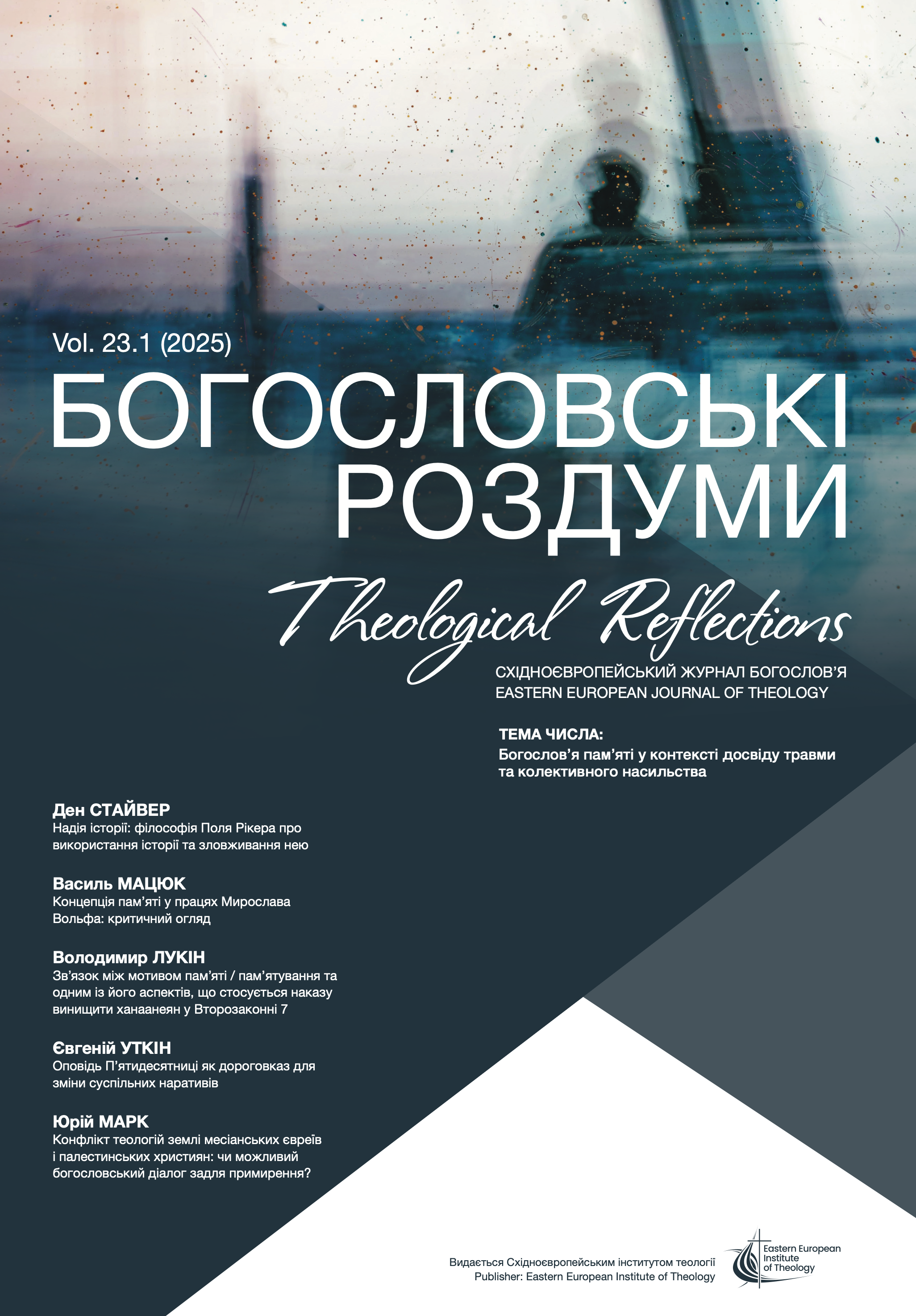Dietrich Bonhoeffer. 80 Years Since His Passing
DOI:
https://doi.org/10.29357/2789-1577.2025.23.1.6Keywords:
Bonhoeffer, responsible action, “last things” , “penultimate things” , God’s will, pacifism, war, ethics, “cheap grace”, etsi deus non daretur, resistance, “death of God”, secularization, tyrannicideAbstract
On 9 April 2025, Christian academia commemorated the 80th year since the death of the prominent German theologian and pastor Dietrich Bonhoeffer, who was executed by the Nazis a month before the end of World War II. Bonhoeffer left behind a great legacy as a minister of the church, as a patriot of his people, and as an author of theological works. Today, his theological contribution includes sixteen volumes of texts plus one volume of registers and appendices in German. Only the eighth volume of Widerstand und Ergebung, which contains letters and notes written by Bonhoeffer when he was already behind bars since April 1943, has been translated into Ukrainian. It was published under the title Sprotyv i pokora (eng. Resistance and Obedience). Any serious study of Bonhoeffer’s work that is being conducted in Ukraine today should be based on these primary sources. One of the main questions that Bonhoeffer raises in his work is: “Who can stand?” His answer is: not the one for whom reason, principles, conscience, personal freedom, and virtue are the highest authority, but the one who is ready to sacrifice all of this if he is convinced that by faith and through an exceptional connection with God he is “called to obedient and responsible action.” The life of such a responsible person is a response to the request and call of God. The only question is “where are these responsible people?” (wo sind die Verantwortlichen?).
References
- Altizer, T.J.J. The Gospel of Christian Atheism. Philadelphia: Westminster Press, 1966.
- Bonhoeffer, Dietrich. Dietrich Bonhoeffer Werke: Band 12. Berlin 1931–1932. München: Verlagsgruppe Random House, 1997.
- Bonhoeffer, Dietrich. Dietrich Bonhoeffer Werke: Band 4. Nachfolge. München: Verlagsgruppe Random House, 1989.
- Bonhoeffer, Dietrich. Dietrich Bonhoeffer Werke: Band 6. Ethik. München: Verlagsgruppe Random House, 1992.
- Bonhoeffer, Dietrich. Herausgegeben von Eberhard Bethge, Dietrich Bonhoeffer Werke: Band 2. Akt und Sein: Transzendentalphilosophie und Ontologie in der systematischen Theologie. München: Verlagsgruppe Random House, 1988.
- Bonhoeffer, Dietrich. Sprotyv i pokora. Lysty i notatky z-za hrat [Letters and Papers from Prison]. Kyiv: Dukh i Litera, 2018. [in Ukrainian].
- Cox, Harvey. The Secular City: Secularization and Urbanization in Theological Perspective. NY.: Macmillan Publishing Co., Ing., 1976.
- de Gruchy, John W. “The Reception of Bonhoeffer’s Theology.” In The Cambridge Companion to Dietrich Bonhoeffer, edited by Johnn W. de Gruchy, 93–109. Cambridge: Cambridge University Press, 2005.
- Green, Clifford J. “Pacifism and Tyrannicide: Bonhoeffer’s Christian Peace Ethics.” Studies in Christian Ethics. 2005. Volume 18 (Issue 3): 31–47.
- Hauerwas, Stanley. “Dietrich Bonhoeffer.” In The Blackwell Companion to Political Theology Blackwell Companions to Religion, edited by Peter Scott and William T. Cavanaugh, 136–149. Oxford: Blackwell Publishing, 2004.
- Haynes, Stephen. The Battle for Bonhoeffer. Grand Rapids: William B. Eerdmans Publishing Company, 2018.
- Kant, Immanuel. “Vidpovid na zapytannia: Shcho take Prosvitnytstvo?” [What Is Enlightenment?] V Myslyteli nimetskoho romantyzmu. Z nimetskoi pereklav Oleh Feshovets, uporiadnyky Leonid Rudnytskyi, Oleh Feshovets, 158—161. Ivano-Frankivsk: Lileia-NV, 2003. [in Ukrainian].
- Lawrence, Joel. Bonhoeffer: A Guide for the Perplexed. NY: T&T Clark International, 2010.
- Livingston, James C. and Fiorenza Francis Schussler. “The Theologies of Karl Barth and Dietrich Bonhoeffer.” In Modern Christian Thought. Volume 2. The Twentieth Century, edited by Livingston James C.; Fiorenza Francis Schussler, 96–132. Minneapolis: Fortress Press, 2006.
- March, Charles. “Dietrich Bonhoeffer.” In The Modern Theologians. An Introduction to Christian Theology in Twentieth Century. Second Edition, edited by David F. Ford, 37–51 Oxford: Blackwell Publishing, 2003.
- March, Charles. Reclaiming Dietrich Bonhoeffer. The Promise of His Theology. Oxford: Oxford University Press, 1994.
- Nietzsche, Friedrich. Po toi bik dobra i zla. Henealohiia morali [On the Genealogy of Morality: A Polemic]. Pereklav z nimetskoi A. Onyshko. Lviv: Litopys, 2002. [in Ukrainian].
- Potter, Peter M. “Lost in Translation: What Did Bonhoeffer Mean by “Coming Age.”Theology Scotland. XV.1. (2008): 41–49.
- Raschke, Carl A. Critical Theory. Downers Grove: IVP Academic, 2016.
- Robbison, John A.T. Honest to God. Philadelphia: The Westminster Press, 1963.
- Selby, Peter. “Christianity in a World of Abe.” In The Cambridge Companion to Dietrich Bonhoeffer, edited by Johnn W. de Gruchy, 226–245. Cambridge: Cambridge University Press, 2005.
- Tietz, Christine, and Zimmermann, Jens, eds. Bonhoeffer, Religion and Politics. Frankfurt am Main: Peter Lang, 2012.
- Бонгеффер, Дитрих. Спротив і покора. Листи і нотатки з-за грат. Київ: Дух і Літера, 2018.
- Кант, Іммануїл, “Відповідь на запитання: Що таке Просвітництво?” В Мислителі німецького романтизму. Переклав з німецької Олег Фешовець, упорядкували Леонід Рудницький, Олег Фешовець, 158–161. Івано-Франківськ: Лілея-НВ, 2003.
- Ніцше, Фрідріх. По той бік добра і зла. Генеалогія моралі. Переклав з німецької А. Онишко. Львів: Літопис, 2002.
Downloads
Published
How to Cite
Issue
Section
License
Copyright (c) 2025 Anatoliy Denysenko

This work is licensed under a Creative Commons Attribution-NonCommercial 4.0 International License.
All articles published in the Journal are distributed under a Creative Commons Attribution-NonCommercial 4.0 International License
By submitting an article for publication in Theological Reflections: Eastern European Journal of Theology the author grants the editors the right to publish the article and distribute it in electronic and print form.
The author reserves all copyrights and the right to use the materials of the article in whole or in part for educational purposes, to write his own dissertations, to prepare abstracts, conference reports, oral presentations, etc., as well as post electronic copies of articles (including the final electronic version downloaded from the journal’s official website) on non-commercial web-resources without the consent of the editorial board and founders.



